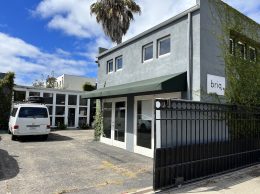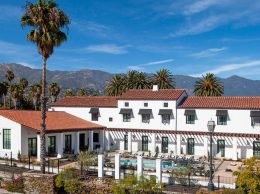UPDATED: Bank of Santa Barbara CEO search underway
IN THIS ARTICLE
- Banking & Finance Topic
- Marlize van Romburgh Author
By Marlize van Romburgh Friday, May 16th, 2014
The Bank of Santa Barbara is searching for a new CEO as it races to comply with a regulatory order related to violations of Bank Secrecy Act reporting rules.
The bank said Eloy Ortega has left his position as CEO of the Santa Barbara-based lender and that it’s now searching for a new chief executive. Board members declined to comment on the reasons for Ortega’s departure.
Ortega told the Business Times he was “stepping down as CEO due to differences in strategic direction with the board of directors.”
Chief Operating Officer Joanne Funari has been appointed interim CEO, the bank told the Business Times on Friday. The board has also created a search committee to recruit a new chief executive.
“The timeline is of high priority for us,” Dave Mokros, the bank’s chairman, said in an earlier interview.
The search for a CEO comes soon after the bank entered into an agreement with one of its regulators, the Federal Deposit Insurance Corp. The February consent order, which was made public last month, relates to issues with the bank’s reporting under the Bank Secrecy Act, or BSA, a piece of legislation designed to combat money laundering and tax evasion, and its internal controls.
“At this point we feel very strongly and positively that we have put in place the resources and the training to meet both of those two items that are on the consent order,” bank board member Julie McGovern said in a May 13 interview.
The regulatory order followed a routine bank examination in mid-2013. The FDIC said it doesn’t make the exam reports public and that it can’t comment on specific issues at a bank. In the consent order, regulators give the bank 30 days to comply “in all material respects with the BSA and its rules and regulations” and to “correct internal control weakness.”
In response, the bank has built out its compliance department, Funari told the Business Times. “They’ve been working diligently and have done all the training, and now internal controls are in place and are just being tested,” she said.
Funari joined the company in late 2013 from Heritage Oaks Bank. There, she had led Heritage Oaks’ Business First Bank division, which she and Ortega co-founded in 2001 and sold to Heritage in 2007.
After the sale to Heritage Oaks, Ortega became the founding president and CEO at Los Angeles-based Promerica Bank, a lender aimed at serving the Latino community. He then returned to the South Coast and assembled a team of prominent business leaders including Kinko’s founder Paul Orfalea, real estate developer and philanthropist Tom Parker and Venoco owner Tim Marquez to purchase The Bank of Santa Barbara from its struggling parent firm, Michigan-based Capitol Bancorp.
Since then, the Santa Barbara bank has returned to profitability and opened a second branch. Its assets have increased from $63 million five years ago to $157 million now. Last year, it earned $1.6 million, compared to $1.5 million in 2012, but it lost $107,000 in the first quarter of this year.
The Orfalea Family Foundation, the Hutton-Parker Foundation, the Marquez family and South Coast businessman Leonard Himelsein are its major shareholders.
Funari will continue to lead the bank’s growth plans, Mokros said.
Noting the bank’s three-fold growth since 2009, Ortega said the bank has a “fabulous team” in place and that he’s “confident they’ll continue to be successful.”
Expanding requirements
Enacted in 1970, the Bank Secrecy Act was designed to help law enforcement agencies identify possible money launderers and drug traffickers by having banks report red-flag activity such as cash transactions of more than $10,000. Regulators can slap monetary fines and regulatory enforcement actions on banks that fail to comply.
After the Sept. 11, 2001 terrorist attacks, the BSA’s scope was expanded under the Patriot Act.
Banks are now required to monitor and report a wide range of account activities and to implement a customer identification program as part of the effort to spot not only potential money laundering and tax evasion but also possible terrorist activity.
The American Bankers Association has pushed back against expansion of the BSA reporting requirements, which it says can be particularly taxing on community banks with limited resources.
“Banks of all sizes tell us that putting together the staff and resources to maintain this compliance is increasingly difficult,” said Rob Rowe, senior counsel with the Washington, D.C.-based industry advocacy group.
The wider scope of the BSA means that Internet-based retailers, exporters or businesses that deposit and withdraw large amounts of cash, such as restaurants, can all cause a bank to come under heightened regulatory scrutiny.
“It used to be that a community bank’s customers were all doing business locally,” Rowe said. “Now with the rise of Internet retail and the global marketplace, there’s a lot more for a small bank to keep track of.”
McGovern said The Bank of Santa Barbara has boosted its compliance resources in response to regulators’ concerns. “We went from having a half-time leader focusing on BSA, to now a whole department,” she said.
The FDIC said its examination reports are confidential and that it can’t comment on agreements with specific banks. “As the supervisor for a bank, the FDIC will issue an enforcement action against an institution for numerous reasons,” agency spokesman Greg Hernandez said in an email to the Business Times.
Once issued, a consent order becomes part of a bank’s examination process. “FDIC examiners will work with a bank to make sure it complies with the stipulations of the consent order,” he said.
The board hopes to have a new CEO in place and to have made progress on the regulatory front by its August shareholder meeting, McGovern said.
[EDITOR’S NOTE: This story was updated at 12:50 pm. on May 16 with details on the bank’s CEO search and the appointment of Joanne Funari as its interim chief executive.]











